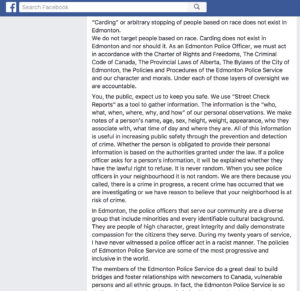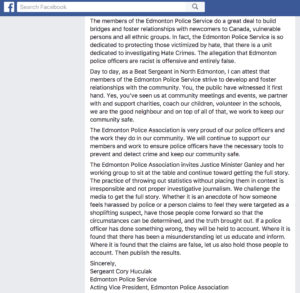
This is an updating post about the issue of carding in Edmonton. If you’ve been here before, you’ll want to jump down for the latest as items are included in chronological order.
Two different examinations of Edmonton Police Service (EPS) “street checks” show racial profiling on our city streets. Now one of the groups involved in investigations is asking for the process, also known as “carding” to be banned in Edmonton, and Alberta.
Carding is when police stop a person on the street and ask them for their ID and other personal information. Since it’s not connected to a crime police can’t force you to talk to them, but it’s doubtful many people know that or would feel comfortable saying “nope” to a police officer.
On June 27, Black Lives Matter-Edmonton and CBC Edmonton both released analysis of Edmonton Police street checks.
Indigenous women nearly 10 x more likely to be street checked by Edmonton police, says new data #carding #Yeg #ableg https://t.co/8gGTIL2x9l pic.twitter.com/rMX4OrxNfu
— Andrea Huncar CBC (@andreahuncar) June 27, 2017
The BLM-Edmonton numbers included street checks between 2012 and 2016. The CBC story just looked at 2016, following up on previous work the newsroom had done on the issue.
Both looks at the numbers came to the same conclusion: Edmontonians who are Indigenous and Black were more likely to be stopped by police. Some of the instances were very obvious in the racial profiling, such as Indigenous women being stopped more than ten times as often as white women.

Stats showing the racially-skewed police actions. image: Progress Alberta and BLM Edmonton
The Edmonton Police responded by saying the collecting of information from people not accused of any crime is integral to solving crimes. They failed to prove this beyond a couple of anecdotal examples.
Aboriginal women, black people much more likely to be ‘carded’ by Edmonton police, says advocacy group: https://t.co/gMG1cXKcMx #yeg
— Global Edmonton (@GlobalEdmonton) June 27, 2017
The following day, Progress Alberta released the data that BLM-Edmonton had used in their examination in an effort to allow anyone who wants to double-check the numbers to do so.
Edmonton’s got a carding problem. But don’t just take our word for it — see the raw data for yourself: #ableg #yeg https://t.co/gnfeV2sYAC
— Progress Alberta (@ProgressAlberta) June 28, 2017
The police chief then weighed in with an op-ed in the Edmonton Journal. Much like the earlier EPS defence of carding, chief Rod Knecht used a couple of anecdotes to try and make the case for the practice.
Opinion: Police street checks based on circumstance, not race https://t.co/ZTDegLvhBQ
— Sgt. Michael Elliott (@AFPAElliott) June 29, 2017
In both responses by Edmonton Police there was no denial the numbers showed inequality of who was being stopped by police, but there was denial it was racial profiling. Police also didn’t produce any data of their own to prove the practice solves or prevents crimes.
Bashir Mohamed and Reakash Walters got their own op-ed to respond to the chief on behalf of BLM-Edmonton.
.@BashirMohamed and I thought we would help ‘ol Rod out and serve a bit of truth. https://t.co/gSIVAZmHvB
— Reakash Walters (@Reakash) June 30, 2017
As Mohamed and Walters explain, nobody is asking police to stop talking to people out in the communities they work in, nor would they be stopped from asking for information from people they’re speaking to about a crime. The request to ban carding is about stopping police from asking for ID and personal information, and storing that information in their database, when people aren’t suspected of, or connected to, any crime.
The Edmonton Journal has since talked to people who have been carded.
Four Edmontonians on what it’s like being ‘carded’ by police https://t.co/xT5uh5VoZW #yeg pic.twitter.com/K7EeIvySyS
— Edmonton Journal (@edmontonjournal) July 3, 2017
Ways to learn more, do more
Coming up in Edmonton, Desmond Cole will speak at an event about carding on July 15. Cole’s been a vocal advocate against the practice in Toronto, even leaving his column at the Toronto Star because of (journalism) backlash. Cole will be joined by April Eve Wiberg, founder of Stolen Sisters.
Progress Alberta also has a form you can use to send an email to your MLA about the issue.
You can also let your city councillor, or the EPS, know how you feel about the racial profiling. The province is reviewing street checks though, which is why your MLA figures into things. The provincial government is expected to come up with new rules for the practice, and could even go as far as banning it (that’s what Black Lives Matter-Edmonton is asking for).
Activists call for province-wide ban on street checks, justice minister promises guidelines https://t.co/MHUYDWfDvk #yeg #ableg pic.twitter.com/7r3OpyquMl
— Edmonton Journal (@edmontonjournal) June 27, 2017
This is going to continue to be an issue in Edmonton, and Alberta, especially as we head into the municipal elections in October. One of the people sharing their story of carding in that Edmonton Journal story is running for a council seat. Expect other council candidates to be asked about their views too.
I’ve experienced carding first hand as an indigenous man. It breaks important trust btw law enforcement and communities. #yegcc (1/2)
— Aaron Paquette (@Ward4Aaron) June 27, 2017
UPDATE: July 5
The Edmonton Police Association is weighing in on behalf of officers the union represents. The acting VP wrote an open letter to the community saying that carding doesn’t happen and officers would never do anything racist.
Check out the open letter below (forgive the screenshots, a shared version of the letter has been taken offline):
You can also read the open letter at the Edmonton Journal’s website.
Much like the police chief, the union is saying that nobody has done anything racist. They, of course, are missing the fact you can do something racist without being a racist, and they don’t appear willing to discuss what the street check stats could mean for how police do their work in our communities. That’s the real shame in this.
UPDATE: July 6
Nevermind. The union VP never read the reports or looked at the numbers analyzed by Black Lives Matter or the CBC.
UPDATE: July 10
The Edmonton Sun’s Lorne Gunter offers up a right-leaning perspective on police checks. Yes, this is an issue that crosses the political spectrum, as Gunter points out it’s a violation of rights to ask for ID and personal information outside of investigations.
And Desmond Cole’s visit to Edmonton (he’s also speaking in Calgary and Lethbridge) is getting some attention. He’s got a simple answer for what the province should do in its review of carding, and it echoes Gunter’s comment;, check the Charter of Rights and Freedoms and ban the practice.
UPDATE: July 12
More from Desmond Cole as he hits Alberta for a speaking tour with Progress Alberta around carding. Some very strong messages around the problem with carding from Cole here.
(Progress Alberta was involved with the Black Lives Matter data analysis in Edmonton, and in Lethbridge too. They’ve also touched upon this in Calgary in their coverage as well.)
There’s also a post over at Progress Alberta that details when and where police can ask for your ID and personal information, and when and where they can’t detain you. It’s a good overview from the Canadian Civil Liberty Association, and highlights what is at the centre of street checks; that police don’t have a right to collect information from people they encounter on the street if it’s not connected to a crime.
UPDATE 2
The Edmonton Police Commission is going to review street checks to see if it’s “respectful of all the people served by the EPS.” The review will be done by an outside investigator. The mayor is also supporting the review.
I have high expectations that this review is open/transparent, giving a fair airing to both community concerns & policing perspectives. #yeg https://t.co/F5wfBvWOtF
— Don Iveson (@doniveson) July 12, 2017
While the review is a good (PR) move, I’m not sure what new information it’s going to turn up that wasn’t already found in the two examinations of carding data by CBC and Black Lives Matter Edmonton. If the new review shows the same over-representation of BIPOC Edmontonians being stopped by police what’s going to happen?
Unless the data police turned over for those two reports is wrong or faulty, we’ll be sitting with a third analysis showing racial profiling. And that’s when the police commission, the police service, city council and the provincial government have to actually stand with or against communities asking for a ban. So far they are choosing more reviews over listening to people who say they are being criminalized and victimized. Not a good look for a city of reconciliation.
The funny thing is, (funny in that sad, time-wasting, ignoring minority and vulnerable voices kind of way) we can look at other places where the issue of carding has already been under scrutiny and see exactly where this is going to end up.
UPDATE: July 14
Groups involved in the issue of police carding aren’t changing their request in the wake of the review by the Edmonton Police Commission. Both Black Lives Matter-Edmonton and the Stolen Sisters and Brothers Awareness Movement want the practice to stop and the data collected to be destroyed by January 1, 2018.
Here’s their statement:
UPDATE: July 17
Desmond Cole was joined by Tanya Harnett and April Eve Wiberg at the last of three Alberta Stop Carding events.
Folks gathering to discuss the racist practice of Carding in #yeg #StopCarding pic.twitter.com/j4viaudmMk
— Reakash Walters (@Reakash) July 16, 2017
Hundreds turned out to hear more about carding, share stories of police targeting and systemic racism, and send a message to the justice minister ahead of a provincial review of carding.
None of Edmonton’s newsrooms were at the event and we had some thoughts about that.
UPDATE: July 18
Black Lives Matter-Edmonton let everyone know that the Edmonton Police Service invited a couple of representatives to a meeting to talk about carding. BLM-YEG doesn’t want to have a closed-door meeting, so they’re inviting everyone down to the building to try and share their voices and stories. If EPS won’t let them all in, this will be a event outside of the building.
UPDATE: July 19
Police didn’t end up opening the meeting to the public. So Black Lives Matter-Edmonton and other members of the community met outside. The police chief wouldn’t speak with them, though another officer was sent out to address the group.
1 item on their agenda: “community engagement” while 20 community members were refused entry & instead stood outside, walled in by pylons pic.twitter.com/KCyF8SIn4m
— Reakash Walters (@Reakash) July 20, 2017
Some groups did send representatives to the meeting with police, though the police chief couldn’t remember which groups.
The chief says the discussion in the private meeting was good and that EPS has four steps to move forward on. Stopping the practice isn’t on the list.
Next up: The Edmonton Police Commission has a meeting Thursday, July 20 at noon. Their independent review of carding is on the agenda. The meeting is open to the public.
UPDATE: July 20
The police commission meeting did see some members of the community speak publicly, including BLM-YEG’s Bashir Mohamed. He reiterated that coming to the conclusion that carding is racial profiling doesn’t mean officers are racist, and doesn’t mean people hate them, but simply that the system needs to change.
The police chief is pushing back, saying that carding isn’t a violation of people’s rights and if it was a problem there would be more formal complaints. This is obviously going to be a more drawn-out and painful debate than it needed to be.
UPDATE: July 25
Want to see what Demond Cole had to say about police carding in Alberta? Check out his speaking notes from the first stop on his tour, in Lethbridge.
UPDATE: August 21
It got quiet there for awhile. But it didn’t get any better.
Edmonton police might be sharing information they collect from carding with other law enforcement agencies. We don’t know for sure though. There doesn’t appear to be an EPS policy about whether, or how, to do that and the police service won’t release information to show what it has shared (if anything) unless someone pays for a freedom of information request.
UPDATE: August 25
The next steps in Edmonton, and Alberta’s contentious carding issue have been announced by the provincial government. Around 100 community groups and organizations will be surveyed by the Alberta government as it tries to come up with new rules for the practice.
Alberta would be the second province to look at changing or overhauling the practice of carding, after Ontario brought in new rules to try and deal with what has been found to be racial profiling.
Also, Edmonton newsrooms including quotes and reactions from police about how collecting ID and personal information from innocent people is a “critical component” of policing should really ask for some proof of how critical. I think we’ve counted about 3 or 4 anecdotal stories out of 20,000+ annual street checks. Not looking too critical, if you ask me.
UPDATE: October 4, 2017
The Edmonton Police Commission heard a brief history of Black Edmontonians and Albertans, as it relates to modern racism and reconciliation. The Edmonton Police are being asked to stop collecting IDs and personal information from people in random street checks, because the practice has been found to target Black and Indigenous Edmontonians more often. Edmonton’s past racist aggressions are far from reconciled, as was noted at the meeting which was steps away from a portrait of a former mayor now connected to the KKK.
UPDATE 2:
CBC’s Andrea Huncar had a related story about an Indigenous man appealing his conviction because of racial profiling. It ties into a lot of Edmonton’s reconciliation and racism stories from the last few months. Most interesting is that the guy pulled over for not having bike lights (and suspected of having stolen the bike) never received a ticket for that, but sure got arrested for a bunch of other things after a police “hunch”. He also didn’t get his bike back for a year. This will be an appeal to watch.
UPDATE 3:
The crew over on High Level Showdown also discussed carding this summer. A good part of the conversation got at the point that police may be acting out of systemic racism but that doesn’t mean officers are all racists. The hosts also talked about the need for more data to be collected to uncover systemic racism.

UPDATE: October 11, 2017
Culture and politics blog Pyriscence asked election candidates what they think about police carding and what they’d do about it if they were on the next city council. A lot of current councillors (who are likely to be re-elected) are going to defer to the provincial and police commission reviews currently happening.
UPDATE: November 17, 2017
If you’ve been following the carding issue in Edmonton, and Alberta, you know that Progress Alberta has been among the groups pushing for an end to this practice. They’re now asking their supporters to help fund us here at EQ to work on a new story.
It’s not just a general story on carding though. We’ll be looking into something that just happened here in Edmonton.
A group of young men appear to have been racially profiled at a local gym and, you can see in the video below, they were then carded by police who had been called out but wouldn’t tell the men what they were being charged with or if they were being detained. It doesn’t sound like any charges were laid and the gym’s reasons for trying to kick the men out changed throughout the incident.
We’re glad that Progress Alberta is helping share this story and we’re happy to report we are now looking into this story. Stay tuned!
As new issues and items arise, we’ll add them to this post so the latest developments are in one place.
Post last updated: Wednesday, November 22, 2017
If you enjoyed this story, and want to see more like it, consider supporting us.
Support EQ





